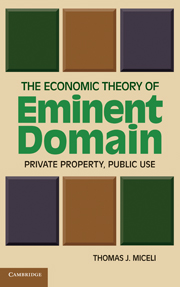Appendix
Published online by Cambridge University Press: 05 June 2012
Summary
This appendix provides technical details underlying the results presented in the various chapters, as well as notes on the relevant literature.
Chapter 1
Introduction: A Framework for Analysis
This section provides a brief review of the key efficiency concepts that economists typically employ in evaluating alternative allocations of resources. The first and most fundamental concept is Pareto efficiency (also referred to as Pareto optimality).
Pareto Efficiency
Consider the decision of how to divide a fixed quantity of goods or services between two individuals. The Pareto-efficient divisions, or “allocations,” are the best among all possible allocations in the sense that they meet the following two criteria. First, an allocation A is said to be Pareto superior to any other allocation B if both (all) individuals are at least as well off under A as compared to B, and at least one individual is strictly better off under A. Second, an allocation A is said to be Pareto efficient if there exists no other allocations that are Pareto superior to it. Pareto superiority thus provides a means of ranking any two allocations, whereas Pareto efficiency identifies the best among all feasible allocations.
An appealing feature of Pareto efficiency, as the previous definitions suggest, is that it is based on unanimous approval of any proposed reallocation, given some initial entitlement point. In other words, any changes that are consistent with the Pareto criteria must be consensual in the sense that all individuals must approve of them (or at least not object to them).
- Type
- Chapter
- Information
- The Economic Theory of Eminent DomainPrivate Property, Public Use, pp. 159 - 186Publisher: Cambridge University PressPrint publication year: 2011



